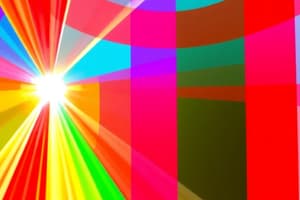Podcast
Questions and Answers
Why is it crucial to cover the optical fiber with a quenching solution in the Thoths Cold Dee Niyon ionization chamber application?
Why is it crucial to cover the optical fiber with a quenching solution in the Thoths Cold Dee Niyon ionization chamber application?
- To enhance the strength of bikes or cars searching for sprockets
- To decrease the reflection of light from the lenses
- To enable proper functioning of the fiber optic sensors (correct)
- To reduce the energy or power passing through the small area
What is the purpose of applying a coating of Off-The-Shelf Stimulated Emission of Radiation (SER) fiber optic sensors to a Thoths Cold Dee Niyon ionization chamber application?
What is the purpose of applying a coating of Off-The-Shelf Stimulated Emission of Radiation (SER) fiber optic sensors to a Thoths Cold Dee Niyon ionization chamber application?
- To enhance the clarity of the lenses used in the small device
- To improve the strength of bikes or cars searching for sprockets
- To decrease the power passing through the small area
- To increase the reflection of light and reduce the number of diverging lens surfaces (correct)
What is the role of Dee Mirror coating on the lenses used in the small device?
What is the role of Dee Mirror coating on the lenses used in the small device?
- To enhance clarity of lenses used in the small device
- To improve strength of bikes or cars searching for sprockets
- To decrease energy or power passing through the small area
- To increase reflection of light and reduce diverging lens surfaces (correct)
Why is using correct back history or previous features important in this application process?
Why is using correct back history or previous features important in this application process?
What is the significance of strength of bikes or cars searching for sprockets in relation to the lenses used in this device?
What is the significance of strength of bikes or cars searching for sprockets in relation to the lenses used in this device?
What is the purpose of covering the optical fiber with a quenching solution?
What is the purpose of covering the optical fiber with a quenching solution?
Why is the clarity of the lenses important in the small device?
Why is the clarity of the lenses important in the small device?
What is the significance of using Off-The-Shelf Stimulated Emission of Radiation (SER) fiber optic sensors in this application?
What is the significance of using Off-The-Shelf Stimulated Emission of Radiation (SER) fiber optic sensors in this application?
How does the Dee Mirror coating on the lenses affect the device?
How does the Dee Mirror coating on the lenses affect the device?
Why does a small area generate a significant amount of energy or power?
Why does a small area generate a significant amount of energy or power?
Flashcards are hidden until you start studying
Study Notes
-
Lalit Rathi welcomes viewers to his YouTube channel, where they have uploaded a video about covering optical fiber with a quenching solution in a three-level and for level laser process
-
The topic of the video is about applying a coating of Off-The-Shelf Stimulated Emission of Radiation (SER) fiber optic sensors to a Thoths Cold Dee Niyon ionization chamber application
-
A small area generates a significant amount of energy or power, which will pass through and become much larger once it leaves the small area
-
The clarity of the lenses used in this small device is important, as the strength of the bikes or cars searching for the sprockets corresponds to the strength of the lenses, which in turn affects the number of diverging lens surfaces
-
The lenses are coated with a surface of Dee Mirror to increase the reflection of the light and reduce the number of diverging lens surfaces, making it more efficient
-
The decision to cover the optical fiber with a quenching solution is crucial for the fiber optic sensors to function properly in the Thoths Cold Dee Niyon ionization chamber application
-
The video discusses the importance of using the correct back history or previous features, as these can help in the application process, and the need for an appropriate stimulated emission of radiation fiber optic sensor.
-
Lalit Rathi welcomes viewers to his YouTube channel, where they have uploaded a video about covering optical fiber with a quenching solution in a three-level and for level laser process
-
The topic of the video is about applying a coating of Off-The-Shelf Stimulated Emission of Radiation (SER) fiber optic sensors to a Thoths Cold Dee Niyon ionization chamber application
-
A small area generates a significant amount of energy or power, which will pass through and become much larger once it leaves the small area
-
The clarity of the lenses used in this small device is important, as the strength of the bikes or cars searching for the sprockets corresponds to the strength of the lenses, which in turn affects the number of diverging lens surfaces
-
The lenses are coated with a surface of Dee Mirror to increase the reflection of the light and reduce the number of diverging lens surfaces, making it more efficient
-
The decision to cover the optical fiber with a quenching solution is crucial for the fiber optic sensors to function properly in the Thoths Cold Dee Niyon ionization chamber application
-
The video discusses the importance of using the correct back history or previous features, as these can help in the application process, and the need for an appropriate stimulated emission of radiation fiber optic sensor.
Studying That Suits You
Use AI to generate personalized quizzes and flashcards to suit your learning preferences.




